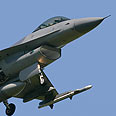
A war that can’t be lost
Op-ed: Iranian response to strike on its nuclear facilities may be unconventional, but it would not threaten Israel's existence
There is a difference between not winning a military confrontation and losing it. Not winning is defined by not achieving the entirety of objectives a belligerent sets for himself prior to entering the conflict; losing means that the adversary, through the use of conventional force or other means, becomes effectively able to impose its own political objectives.
Modern warfare sees the border between winning and losing extremely reduced, as limited wars are based on precise objectives and not the total destruction of the enemy. The simple fact of not achieving them makes it seem as if the endeavor has to be qualified as a "loss."
The rhetoric concerning a possible autumn strike on Iranian nuclear facilities is gaining momentum, international commentators are speculating over grand strategies and tactics while elected officials ponder the cost of such an action, consulting their military staff and screening opinion polls.
An international cacophony of “what ifs” is rising, as all sides attempt to analyze what may be the showdown after years of confrontation. Nevertheless, a question is seldom asked: in the case of an Israeli (or American led) strike on Iranian nuclear facilities, could the Islamic Republic ‘win’ the war?
In this sense, "win" does not merely mean to be able to safeguard a certain percentage of its enriching capabilities but to effectively respond in a way which would increase its regional drive for hegemony and deter in the long run such operations against its national soil. Following the first strike, would Iran be able to respond and dictate the tempo of operations or would it merely be in the position to defend itself while inflicting damages to its adversaries?
Analyzing recent reports, it appears that there are no windows within which Iran and its regional proxies may be able to effectively "win" a military confrontation against Israel and the United States armed forces.
The closure of the Strait of Hormuz, as devastating it may be for the international economic system, is unlikely to hold more than 24 hours as it has been highlighted time and again by the White House as an absolute red line which would trigger the intervention of the US Navy.
The use of ballistic missiles against US bases in the Gulf and/or Arab Gulf monarchies would effectively open a second front which would push the Iranian military to shift focus and lose the strategic balance needed to protect its nuclear facilities. Iran’s regional proxies may also prove to be less of a threat than often stated.
The Palestinian terrorist organizations such as Hamas and the Islamic Jihad are undergoing a period of strategic repositioning due to tension with Egypt and may not seek to be under further Israeli military pressure. In addition to that, it may seem unlikely that these terrorist groups would risk being shattered in an attempt to protect Iran, the sole country in the region actively supporting Bashar Assad's repressive army, which is killing Palestinian refugees in Syria.
Daring Operation
Hezbollah remains the greatest threat to the Jewish State's security. In the case of an attack against Iranian nuclear structures, it is almost certain that the Shiite terrorist group would answer either directly against Israel or through international terrorism. It’s advanced arsenal and long range missile capabilities do represent a major threat to Israel’s security.
If the risk created by Hezbollah’s retaliation cannot be questioned, it should not be forgotten that a great percentage of Lebanese would strongly reject having their country’s infrastructure crippled to defend Iranian interests. The Party of God has to be viewed as highly constrained by the strategic setbacks it is experiencing in Syria and by an entangled Lebanese domestic political situation.
A policy note the Washington Institute for Near East Policy released on June 2012 indicates that even if Teheran may be contemplating a harsh response to a military strike, none of its options would be able to cause unacceptable loses to Israel.
Ehud Barak has been on record saying: “There is no scenario for 50,000 dead, or 5,000 killed—and if everyone stays in their homes, maybe not even 500 dead.” In addition to that, incoming reports indicate that the US may be ready to take defensive action to protect Israel in the case of an Iranian response. If Washington does not undertake the strike itself, it would still support its partner by protecting its territory.
Such considerations are not meant to present a possible strike on Iran as a simple task. Logistically and tactically it remains one of the most daring operations ever to be attempted in modern military history.
Israel’s adversary cannot be considered a rational actor and its response may well come outside conventional strategic thinking. The outcome is not certain and Israel may not be able to achieve all its objectives. As retaliation is expected to be harsh and every civilian and military loss will be followed by personal and national drama, but an Iranian response would in no way be able to threaten Israel's existence the way Arab armies tried to up until 1973.
A debate on the possible outcome of a military action is utterly necessary because if Iran can’t win then Israel and United States can’t lose. The prospect of a war that can’t be lost is extremely dangerous as it creates hubris limiting critical thinking and proper strategic preparation; it nevertheless generates a window of opportunity which is rarely available in the course of history.
Riccardo Dugulin holds a Master degree from the Paris School of International Affairs (Sciences Po) and is specialized in International Security. He is currently working in Paris for a Medical and Security Assistance company. He has worked for a number of leading think tanks in Washington DC, Dubai and Beirut. Personal website: www.riccardodugulin.com










